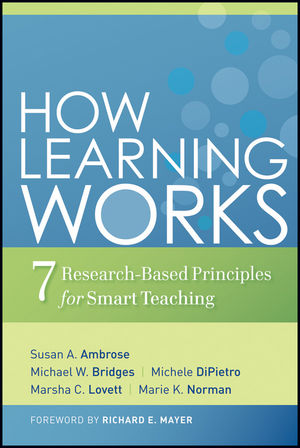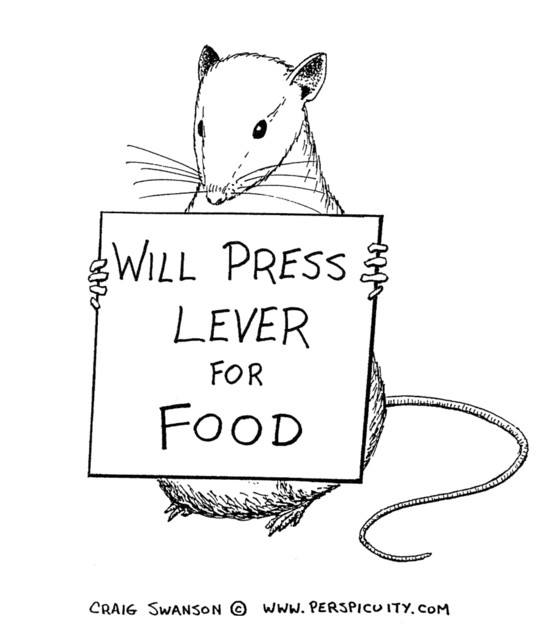This is cross-posted (with slight variation) on my brand new temporary side blog, I have an office. I’m keeping it as a place to process my learning-to-be-a-teacher thoughts, and I might draw from it now and then if I have a thought that comes together well.
 A few days ago, I started How Learning Works, and it brings up a lot of principles from my undergrad psychology studies. The third chapter in particular makes me think of a psychology class I had my last semester of undergrad, which was actually called Learning. It was behavioral psychology learning, not education learning, but a huge chunk of behavioral psychology is operant conditioning—all about shaping behavior with consequences. And this is where motivation comes in.
A few days ago, I started How Learning Works, and it brings up a lot of principles from my undergrad psychology studies. The third chapter in particular makes me think of a psychology class I had my last semester of undergrad, which was actually called Learning. It was behavioral psychology learning, not education learning, but a huge chunk of behavioral psychology is operant conditioning—all about shaping behavior with consequences. And this is where motivation comes in.
Take the different forms of value, for instance. Intrinsic value, my psych professor asserted, rarely comes out of nowhere—there’s almost always something that precedes it. Example: most pianists who play because of the intrinsic value they find in it didn’t just decide, out of the blue, that this pursuit was valuable. The closest jump would be that boredom/curiosity/etc. gave value to exploring the environment, and the piano that happened to be there had instrumental value (get it?) as a way to alleviate boredom/satiate curiosity. Only then can the piano take on its own value. But that often isn’t the case. A lot of pianists had piano lessons as a kid, something selected—and incentivized—by the parent.
Nothing is intrinsically intrinsically valuable, short of basic life needs. Intrinsic value develops with time—sometimes quickly, sometimes not.
Here, though, is the twist: we have to be careful how we reward things. There are risks involved. Lepper, Green, and Nisbett did a study in 1973 with preschool kids—not exactly a college writing class, I know, but bear with me.
 So one day, you sit down three groups of kids with markers and tell them to draw. You tell the first group they’ll get a reward at the end for drawing; you surprise the second group with a reward; and the third group gets no reward. Three days later, you reconvene the groups and set them in a playroom with, among other things, markers and paper. Do you see a change in the rate of drawing?
So one day, you sit down three groups of kids with markers and tell them to draw. You tell the first group they’ll get a reward at the end for drawing; you surprise the second group with a reward; and the third group gets no reward. Three days later, you reconvene the groups and set them in a playroom with, among other things, markers and paper. Do you see a change in the rate of drawing?
Yes. But it’s complicated.
What typically gets reported when the study is cited is that the group that got no reward had higher rates of drawing than the group that was told they’d get a reward. This means, people will say, that extrinsic reward actually undermines motivation. (It’s the whole, I love writing, so if I got paid to do it, it would be ruined! sort of thinking.)
Except you had three groups, remember? And the group of kids that got a surprise reward drew just as much as the group that got no reward. So this means that extrinsic reward has no effect, then? No, not that either.
With a little probing into these kids’ histories, you can break them down into “low-base-rate” and “high-base-rate” drawers—i.e., kids who, left to their own devices, didn’t draw much, and kids who did. The group with no reward saw no change to either group. The group with the surprise reward saw a higher rate in the low-base-rate kids, as did the group with the expected reward. But that group saw a drop in high-base-rate kids.
Why might that possibly be?
Here’s an analogy. I could say, “Want to help me with Project A?” Or I could say, “Want to help me with Project B? I’ll give you five bucks.” While the five dollars is a nice offer, it also might—reasonably—lead you to suspect that there’s something unpleasant about Project B. You go in with the assumption that this is a trade—that you’re taking a loss (your effort) in exchange for a gain (five dollars), as am I (reversed). By offering you the money ahead of time, I’ve framed it as a chore, and since I’m having to add extrinsic value to the equation, Project B must not have intrinsic value.
And that’s the tricky thing with incentives. (Well, one of them.) A lot of people don’t come into a writing class finding writing intrinsically valuable. But lumping on simple extrinsic value isn’t necessarily the best way to resolve that.
I met with my mentor Friday, along with her other mentee. He asked about creating student interest in the class, and it’s a good question—particularly with a class like this. It’s not just that they need a 300-level lit class and they picked the one that looked best; it’s that they need this specific composition class—there’s no element of choice involved, except “Now or later?”
The first thing, our mentor said, is to get them arguing with one another.
Which, when she said it, made perfect sense. These students might not find intrinsic value in writing, but who doesn’t find intrinsic value in being right—in being recognized as being right? Start off there, and writing becomes instrumentally valuable, but not in a way tied to an unrelated reward—in a way that’s organically connected to a reward. Writing isn’t a chore you complete to get a grade; it’s a tool for demonstrating how deliciously right you are.
 Operant conditioning relies on consequences—punishments and reinforcers—as a means of either decreasing or increasing a subject’s likelihood of repeating a behavior. Punishments decrease; reinforcers increase. Both come in positive and negative—either adding or removing something.
Operant conditioning relies on consequences—punishments and reinforcers—as a means of either decreasing or increasing a subject’s likelihood of repeating a behavior. Punishments decrease; reinforcers increase. Both come in positive and negative—either adding or removing something. I see this a lot—in myself and my peers, in writing and work and relationships and life. Fears of failure, of judgment, of rejection—they drive us to seek safety. We write what is least risky. We stay by the trunk, way back from that limb, or maybe out of the tree altogether. All manner of beasts could be loitering up there.
I see this a lot—in myself and my peers, in writing and work and relationships and life. Fears of failure, of judgment, of rejection—they drive us to seek safety. We write what is least risky. We stay by the trunk, way back from that limb, or maybe out of the tree altogether. All manner of beasts could be loitering up there. A few days ago, I started
A few days ago, I started  So one day, you sit down three groups of kids with markers and tell them to draw. You tell the first group they’ll get a reward at the end for drawing; you surprise the second group with a reward; and the third group gets no reward. Three days later, you reconvene the groups and set them in a playroom with, among other things, markers and paper. Do you see a change in the rate of drawing?
So one day, you sit down three groups of kids with markers and tell them to draw. You tell the first group they’ll get a reward at the end for drawing; you surprise the second group with a reward; and the third group gets no reward. Three days later, you reconvene the groups and set them in a playroom with, among other things, markers and paper. Do you see a change in the rate of drawing?